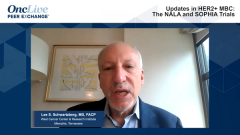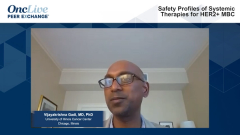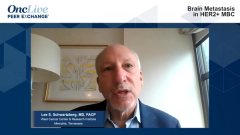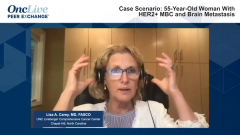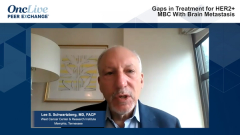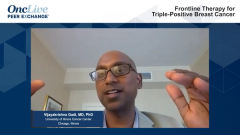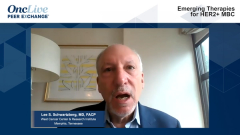
Brain Metastasis in HER2+ MBC
Recommendations for screening patients with HER2-positive metastatic breast cancer for signs of brain metastasis as a consequence of current rates of prevalence.
Episodes in this series

Lisa A. Carey, MD, FASCO: Why don’t we move to talking about brain metastases because that’s obviously an area of huge importance. In NALA, around 30% of the patients had brain metastases that required intervention. What do we know about how common brain metastases are, and what strategies are you using? Are you doing surveillance for brain metastases in HER2 [human epidermal growth factor receptor 2]–positive breast cancer? Lee, why don’t you start?
Lee S. Schwartzberg, MD, FACP: We’ve known, for a long time, that the brain is a common site for metastases in HER2+ metastatic disease. There are population-based studies that suggest that metastases occur at diagnosis of mBC [metastatic breast cancer] in a fraction of patients. But clearly, as you go further on in the lines of therapy, the brain becomes more at risk for being a new site of disease. I haven’t been in the habit of screening patients at the diagnosis of metastatic disease who are asymptomatic, but I’ve gotten more careful at reading a very detailed, focused history about any neurological complaints and taking seriously any complaint—or physical examination finding—that would suggest the correct diagnosis. What I’m saying is that there’s a very low threshold to do a brain MRI, even for a patient who is relatively asymptomatic.
I’ve changed my practice based on the HER2CLIMB data, so if a patient relapses off first-line therapy, even if they’re asymptomatic, I would at least consider getting an MRI in those patients because we now have interventions that clearly make a difference. Overall, across the entire course, now that we have therapy, up to 50% of patients may develop brain metastases. It’s a substantial problem that reflects the fact we’re doing better at controlling systemic disease with the agents we’ve been talking about.
Lisa A. Carey, MD, FASCO: Others?
Reshma Mahtani, DO: I was really shocked at the number of patients who had asymptomatic brain metastases at the time of HER2CLIMB enrollment because of the requirement for a baseline screening brain MRI. That stuck with me. It’s important to recognize that the guidelines don’t call for screening brain MRIs. That being said, as Lee mentioned, we have an agent that has activity in patients with brain metastases, and I’m more inclined to consider it, but we also have to get involved with insurance authorization and coverage for screening MRIs—which is sometimes the deciding factor. But I share the view—now that we have an extremely active agent—that we know even in patients with active brain metastases, the response rate was around 40%. That’s pretty dramatic: to consider doing a brain MRI or, at least, having a low threshold and doing a careful review of systems.
Vijayakrishna Gadi, MD, PhD: I’ll follow up. With the KATHERINE data, even though T-DM1 [trastuzumab emtansine] was very successful in rescuing half the possible metastases, the rate of brain metastases remained the same in the 2 arms. It’s clear what we’re doing in the adjuvant setting, unless somebody doesn’t see neratinib [Nerlynx], still has some risk as the patient migrates into the metastatic setting of having CNS [central nervous system] metastases. Half the metastases that develop in the brain will happen within the first few lines of therapy with HER2+ disease. It’s not 1 of those wait events. It’s an early event that we’re going to deal with, and as we all know, there’s a lot of morbidity with these lesions.
I don’t personally screen everybody who enters the metastatic phase of their disease right out of the gate unless there are clinical factors that suggest it—whether it’s CNS symptoms or maybe a large volume of disease or rapidness of the onset—might do that. I’m finding myself doing an MRI on progression of disease in the metastatic setting, but I’m not surveilling the patients consistently for it. As I talk to people around the country doing CME [continuing medical education]lectures and getting feedback from community colleagues, I’m realizing that it comes down to what my insurance company will let me do. There are pockets of the country where everybody is getting MRIs regularly, all the time, and other pockets where MRIs aren’t happening at all. That’s fascinating as well.
Reshma Mahtani, DO: The other thing that I’m wondering about is your experience. In the HER2CLIMB study, we know that the patients with brain metastases less than 2 cm2, without edema, were allowed to go on these active brain metastases medications. But in the community, I don’t think a lot of physicians are comfortable utilizing a systemic therapy and not referring to their radiation oncologist. There’s that saying that to a carpenter, everyone looks like a nail. When you send a patient to a radiation oncologist and there’s a brain metastasis, there’s an inclination to treat. Has that been your experience as well, all of you, that the radiation oncologists aren’t comfortable?
Lee S. Schwartzberg, MD, FACP: I agree completely. If you send them to the neurosurgeon, they’ll have an operation too.
Reshma Mahtani, DO: Yeah.
Lee S. Schwartzberg, MD, FACP: I agree. I move cautiously into the same thinking, Reshma. If you screen these patients for whatever reason, or you get an MRI and see the pattern of a few small lesions that are 3 to 5 mm—which we see occasionally and are diffuse—then no one is doing the whole brain, even up to 10 lesions, including the community physicians. But doing stereotactic radiosurgery on 10 lesions isn’t a nonmorbid situation in my experience, now that we follow these patients. Maybe we should try systemic therapy in asymptomatic patients and follow them carefully. I don’t think we’d lose anything. But I agree with you. Most community physicians, who don’t focus on breast cancer, haven’t made that leap yet.
Transcript Edited for Clarity




